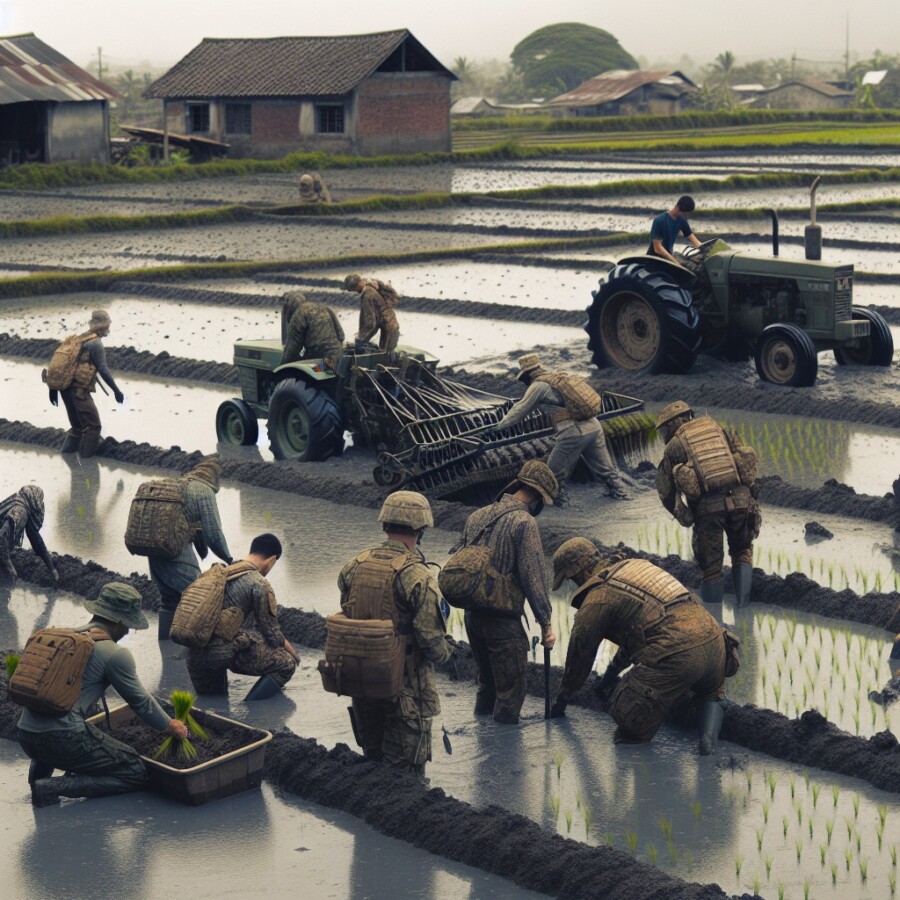In northern India, farmers have been growing makhana, also called lotus seeds, for many years. A farmer named Phool dev Shahni used to collect these seeds from deep ponds. Now, farmers like him are growing makhana in fields with shallow water. This new way is easier and helps farmers earn more money.
Dr. Manoj Kumar helped change how makhana is grown by creating new methods. He showed farmers how to grow these seeds in shallow water, which is easier and more profitable. This change has helped farmers make three times more money. With new seed types and techniques, makhana farming is now better for the environment and helps farmers deal with bad weather.
Growing makhana has changed farming in Bihar and helped farmers like Dhirendra Kumar. He switched from other crops to makhana and made more money, creating jobs for others too. Companies like Madhubani Makhana are also helping by processing and selling makhana around the world. As more people want makhana, these new ways of growing and selling it are making farming better in the area.
Original news source: The ‘superfood’ taking over fields in northern India (BBC)
🎧 Listen:
Slow
Normal
Fast
📖 Vocabulary:
| 1 | makhana | A type of seed also known as lotus seeds |
| 2 | ponds | Small bodies of water, like little lakes |
| 3 | shallow | Not deep |
| 4 | profitable | Making money or a good amount of money |
| 5 | techniques | Special ways of doing something |
| 6 | environment | The world around us, including nature |
| 7 | crops | Plants grown by farmers |
| 8 | processing | Changing something into a different form |
| 9 | methods | Ways of doing things |
| 10 | switch | To change from one thing to another |
| 11 | companies | Businesses that sell things or services |
| 12 | demand | How much people want something |
Group or Classroom Activities
Warm-up Activities:
– News Summary
Instructions: Ask students to summarize the article in their own words in 3-4 sentences. Encourage them to focus on the main idea and key points while practicing their paraphrasing skills.
– Vocabulary Pictionary
Instructions: Divide the class into small groups. Provide each group with a list of vocabulary words from the article (e.g., makhana, farmer, pond, profit). One student from each group will choose a word and draw it on the board while the other group members try to guess the word. This activity will help reinforce their understanding of the new vocabulary.
– Think-Pair-Share
Instructions: Ask students to think about and write down two questions they have about the article. Then, have them pair up with a classmate to discuss their questions. Finally, open up the discussion to the whole class, allowing students to share their questions and thoughts. This activity promotes critical thinking and speaking skills.
– Opinion Poll
Instructions: Divide the class into two groups: one group in favor of traditional farming methods and the other in favor of modern techniques like growing makhana in shallow water. Have students discuss the advantages and disadvantages of each method within their groups. Then, conduct a class poll to see which method the majority of the students prefer and why. This activity encourages students to express their opinions and practice persuasive language.
– Sketch It
Instructions: Pair up the students and ask them to choose a key point from the article (e.g., growing makhana in shallow water) to sketch out. Set a time limit for the sketching activity. Afterward, each pair presents their sketch to the class, explaining the chosen point. This activity combines creativity, speaking practice, and comprehension of the article.
🤔 Comprehension Questions:
1. What is another name for makhana?
2. How did farmers used to collect makhana seeds in northern India?
3. Who helped farmers change the way they grow makhana?
4. How has growing makhana in shallow water helped farmers?
5. Why did Dhirendra Kumar switch to growing makhana?
6. What is Madhubani Makhana doing to help with makhana farming?
7. How are the new ways of growing and selling makhana making farming better in Bihar?
Go to answers ⇩
🎧✍️ Listen and Fill in the Gaps:
In northern India, farmers have been growing makhana, also called (1)______ seeds, for (2)______ years. A farmer named (3)______ dev Shahni used to collect these seeds from deep ponds. Now, farmers like him are growing makhana in fields with shallow water. This new way is easier and helps farmers earn more money.
Dr. (4)______ Kumar helped change how makhana is grown by creating new methods. He (5)______ farmers how to grow these seeds in (6)______ water, which is easier and more profitable. This change has helped farmers make three times more money. With new seed types and (7)______, makhana farming is now better for the environment and helps farmers deal with bad weather.
Growing makhana has changed farming in Bihar and helped farmers like (8)______ Kumar. He (9)______ from other crops to makhana and made more money, creating jobs for others too. (10)______ like Madhubani Makhana are also helping by (11)______ and selling makhana around the world. As more (12)______ want makhana, these new ways of growing and selling it are making farming better in the area.
Go to answers ⇩
💬 Discussion Questions:
Students can ask a partner these questions, or discuss them as a group.
1. What is makhana and why do you think farmers in India grow it?
2. How would you feel if you were a farmer and learned a new way to grow a crop that helped you earn more money?
3. Do you like the idea of trying new methods to grow crops like makhana, even if it might be different from what you’re used to? Why or why not?
4. Do you think it’s important for farmers to adapt to new ways of farming to make more money and help the environment? Why or why not?
5. What do you think about Dhirendra Kumar switching from other crops to makhana and making more money?
6. How do you think companies like Madhubani Makhana are helping farmers by processing and selling makhana around the world?
7. Why do you think more people are interested in buying and eating makhana now?
8. Have you ever tried a new food that you ended up really liking? How did you feel about it?
9. Do you think it’s good for farmers to try growing different crops to see which one is more profitable? Why or why not?
10. How do you think the new ways of growing makhana are making farming better in the area?
11. Why do you think it’s important for farmers to find crops that can withstand bad weather conditions?
12. If you were a farmer, would you consider switching to growing makhana based on the benefits mentioned in the article? Why or why not?
Individual Activities
📖💭 Vocabulary Meanings:
Match each word to its meaning.
Words:
1. makhana
2. ponds
3. shallow
4. profitable
5. techniques
6. environment
7. crops
8. processing
9. methods
10. switch
11. companies
12. demand
Meanings:
(A) Businesses that sell things or services
(B) Changing something into a different form
(C) The world around us, including nature
(D) Small bodies of water, like little lakes
(E) Making money or a good amount of money
(F) A type of seed also known as lotus seeds
(G) Ways of doing things
(H) Not deep
(I) Special ways of doing something
(J) How much people want something
(K) To change from one thing to another
(L) Plants grown by farmers
Go to answers ⇩
🔡 Multiple Choice Questions:
1. What is another name for makhana?
(a) Lotus seeds
(b) Sunflower seeds
(c) Pumpkin seeds
(d) Watermelon seeds
2. How did farmers used to collect makhana seeds in northern India?
(a) From tall trees
(b) From underground caves
(c) From mountains
(d) From deep ponds
3. Who helped change how makhana is grown by creating new methods?
(a) Farmer Phool dev Shahni
(b) Dr. Manoj Kumar
(c) Dhirendra Kumar
(d) Madhubani Makhana
4. What did Dr. Manoj Kumar show farmers how to do with makhana seeds?
(a) Grow them in shallow water
(b) Grow them in deep ponds
(c) Grow them in the mountains
(d) Grow them in the desert
5. How much more money have farmers been able to make by growing makhana with the new methods?
(a) Two times more
(b) Five times more
(c) Three times more
(d) Ten times more
6. Who switched from other crops to makhana and made more money?
(a) Dr. Manoj Kumar
(b) Farmer Phool dev Shahni
(c) Madhubani Makhana
(d) Dhirendra Kumar
7. What are companies like Madhubani Makhana doing to help with makhana farming?
(a) Processing and selling watermelons
(b) Processing and selling pumpkins
(c) Processing and selling makhana
(d) Processing and selling sunflower seeds
8. How are the new ways of growing and selling makhana making farming better in the area?
(a) By making the weather worse
(b) By helping farmers earn more money
(c) By reducing the amount of makhana produced
(d) By making farming more difficult
Go to answers ⇩
🕵️ True or False Questions:
1. Farmers used to collect makhana from deep ponds, but now they grow it in fields with shallow water.
2. The new methods of growing and selling makhana are good for the environment and help farmers deal with bad weather.
3. This new way of growing makhana does not help farmers earn more money.
4. Companies like Madhubani Makhana process and sell makhana globally.
5. Farmers in Bihar, like Dhirendra Kumar, have switched to growing makhana and made more money.
6. Dr. Manoj Kumar did not help farmers grow makhana in a new, easier way.
7. Growing makhana has not made farming better in the area.
8. Makhana, also known as lotus seeds, is not grown by farmers in northern India.
Go to answers ⇩
📝 Write a Summary:
Write a summary of this news article in two sentences.
Check your writing now with the best free AI for English writing!
Writing Questions:
Answer the following questions. Write as much as you can for each answer.
Check your answers with our free English writing assistant!
1. How did Dr. Manoj Kumar help farmers in northern India grow makhana in a better way?
2. Why did Dhirendra Kumar switch from growing other crops to growing makhana?
3. What are some benefits of growing makhana in shallow water instead of collecting them from deep ponds?
4. How has growing makhana helped farmers deal with bad weather?
5. How are companies like Madhubani Makhana helping farmers in Bihar?
✅ Answers
🤔✅ Comprehension Question Answers:
1. What is another name for makhana?
Lotus seeds.
2. How did farmers used to collect makhana seeds in northern India?
They used to collect them from deep ponds.
3. Who helped farmers change the way they grow makhana?
Dr. Manoj Kumar helped farmers change how they grow makhana.
4. How has growing makhana in shallow water helped farmers?
It has made growing makhana easier and more profitable for farmers.
5. Why did Dhirendra Kumar switch to growing makhana?
He switched because he could make more money growing makhana.
6. What is Madhubani Makhana doing to help with makhana farming?
They are processing and selling makhana around the world.
7. How are the new ways of growing and selling makhana making farming better in Bihar?
The new ways are making farming better by helping farmers earn more money and creating jobs for others.
Go back to questions ⇧
🎧✍️✅ Listen and Fill in the Gaps Answers:
(1) lotus
(2) many
(3) Phool
(4) Manoj
(5) showed
(6) shallow
(7) techniques
(8) Dhirendra
(9) switched
(10) Companies
(11) processing
(12) people
Go back to questions ⇧
📖💭✅ Vocabulary Meanings Answers:
1. makhana
Answer: (F) A type of seed also known as lotus seeds
2. ponds
Answer: (D) Small bodies of water, like little lakes
3. shallow
Answer: (H) Not deep
4. profitable
Answer: (E) Making money or a good amount of money
5. techniques
Answer: (I) Special ways of doing something
6. environment
Answer: (C) The world around us, including nature
7. crops
Answer: (L) Plants grown by farmers
8. processing
Answer: (B) Changing something into a different form
9. methods
Answer: (G) Ways of doing things
10. switch
Answer: (K) To change from one thing to another
11. companies
Answer: (A) Businesses that sell things or services
12. demand
Answer: (J) How much people want something
Go back to questions ⇧
🔡✅ Multiple Choice Answers:
1. What is another name for makhana?
Answer: (a) Lotus seeds
2. How did farmers used to collect makhana seeds in northern India?
Answer: (d) From deep ponds
3. Who helped change how makhana is grown by creating new methods?
Answer: (b) Dr. Manoj Kumar
4. What did Dr. Manoj Kumar show farmers how to do with makhana seeds?
Answer: (a) Grow them in shallow water
5. How much more money have farmers been able to make by growing makhana with the new methods?
Answer: (c) Three times more
6. Who switched from other crops to makhana and made more money?
Answer: (d) Dhirendra Kumar
7. What are companies like Madhubani Makhana doing to help with makhana farming?
Answer: (c) Processing and selling makhana
8. How are the new ways of growing and selling makhana making farming better in the area?
Answer: (b) By helping farmers earn more money
Go back to questions ⇧
🕵️✅ True or False Answers:
1. Farmers used to collect makhana from deep ponds, but now they grow it in fields with shallow water. (Answer: True)
2. The new methods of growing and selling makhana are good for the environment and help farmers deal with bad weather. (Answer: True)
3. This new way of growing makhana does not help farmers earn more money. (Answer: False)
4. Companies like Madhubani Makhana process and sell makhana globally. (Answer: True)
5. Farmers in Bihar, like Dhirendra Kumar, have switched to growing makhana and made more money. (Answer: True)
6. Dr. Manoj Kumar did not help farmers grow makhana in a new, easier way. (Answer: False)
7. Growing makhana has not made farming better in the area. (Answer: False)
8. Makhana, also known as lotus seeds, is not grown by farmers in northern India. (Answer: False)
Go back to questions ⇧














